#myersbrigg
Text
youtube
5 notes
·
View notes
Text
The 16 types as rest
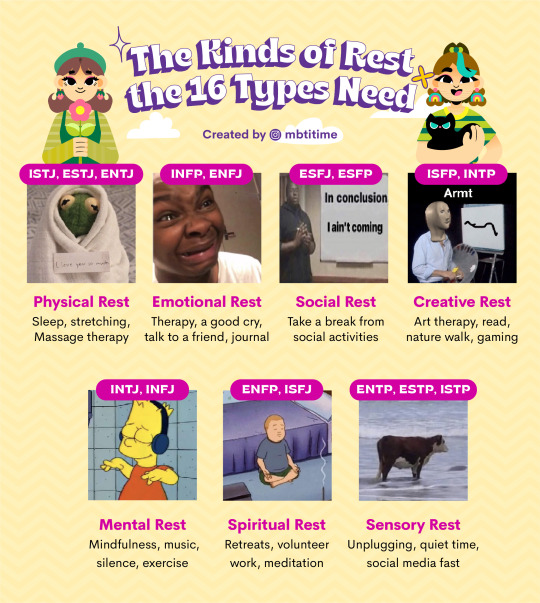
Follow me on:
Instagram, Youtube, Reddit, Twitter, Medium 👉🏻 @ mbtitime
#mbti#16 types#16 personalidades#myersbriggs#myers briggs#infp#infj#intp#intj#istp#istj#isfj#isfp#esfp#estj#estp#enfj#entp#cognitive functions
710 notes
·
View notes
Text
ENFP x INTJ 📱💬✨

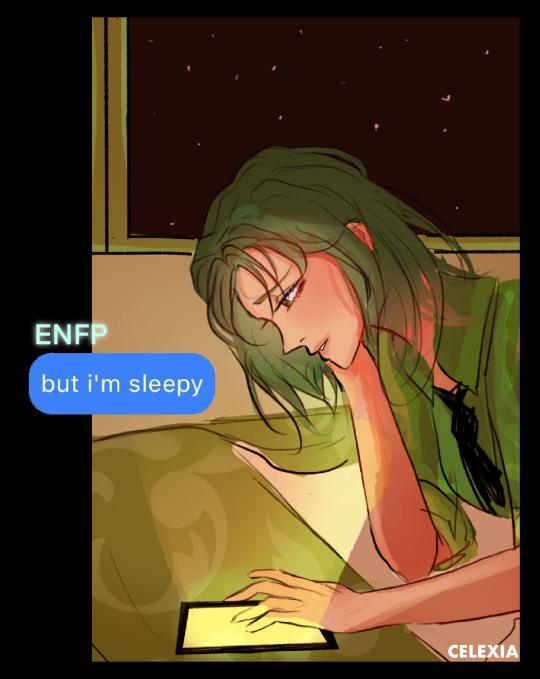
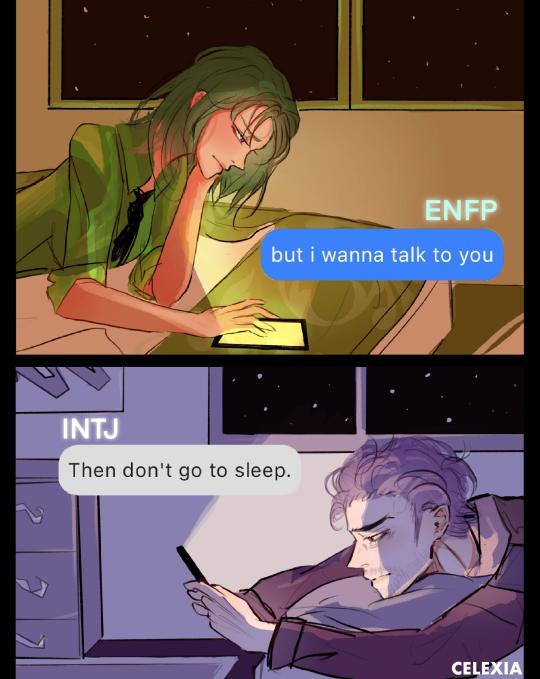

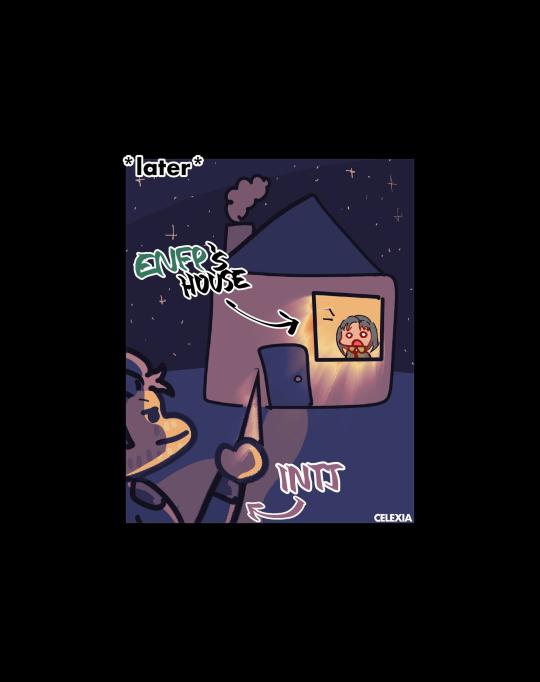
#anime#mbti#drawing#mbtiart#mbtimemes#16personalities#myersbriggs#comic#mbtifun#enfp#intj#intjmemes#mbti intj#enfp memes#enfp thoughts#intj x enfp#enfp life#intj aesthetic
539 notes
·
View notes
Text
Carl Jung once proposed that intuitives may have more sensitivity to smell than other personality types, especially dominant intuitives, because like their preferred cognitive function, smell is subconscious. This got me theorizing that perhaps each personality type has a unique sensory sensitivity. So, based on Jung's idea, I humbly propose:
Sensory Sensitivities of the 16 MBTI Personality Types
Perceivers: Touch
Perception operates in the here and now, as does touch. If something is not within grasp at the same time as you, you can't feel it. Touch senses force and largely operates on an instinctual level. It is subconscious yet concrete, like perception. Perception makes us jump, like feeling a surprise touch.
Thinkers: Sight
Thinking apprehends the here, but not necessarily now, as does sight. You can only see clealry what's near you at a given time. Sight detects danger within vicinity and prompts inhibition. It is conscious yet concrete, like thought. Thought makes us pause, like spotting a snake.
Feelers: Sound
Feeling functions in the now, but not necessarily here, as does sound. You can hear something coming before it is there. Sound gives away incoming threats and stimulates impulse. It is conscious yet abstract, like feeling. Feeling makes us arouse, like hearing a scream.
Intuitives: Smell
Intuition emerges beyond the here and now, as does smell. Sometimes the first thing that hits you is the smell, and it lingers long after. Smell provides warnings in the form of insight. It is subconscious and abstract, like intuition. Intuition makes us understand, like smelling a rat.
#mbti#mbti types#16 personalities#16 personality types#myersbriggs#myers briggs#myers briggs type indicator#all types#mbti types as#mbti research
13 notes
·
View notes
Text
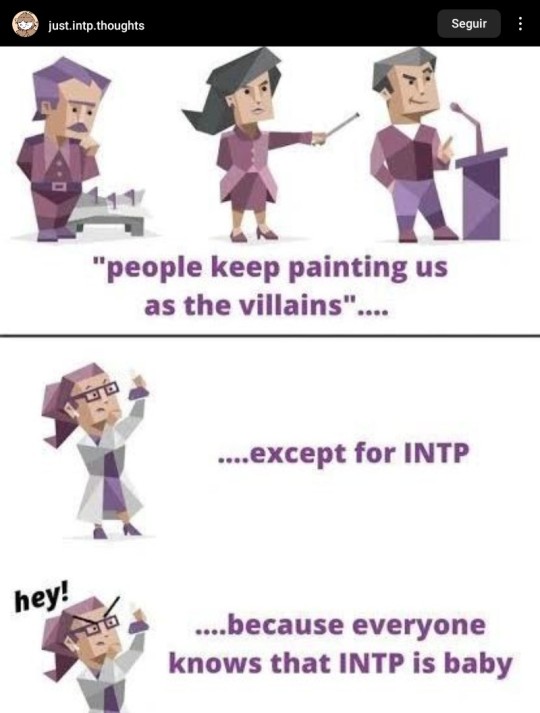
I upload it because... YES. And because I can confirm it, thanks to my big INTP baby: I love you, uncle 😂
24 notes
·
View notes
Photo
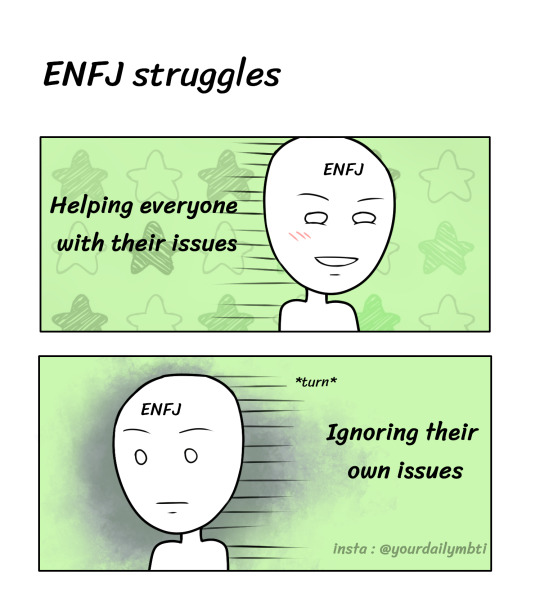
ENFJ struggles ˙ ͜ʟ˙ ~~
#mbti#mbti memes#enfj#infp#mbti types#16 personality types#16 personalities#intp#infj#mbti aesthetic#extrovert#digital painting#digitalart#comic#comics#myersbriggs#enfj meme#myers briggs#mbti functions
30 notes
·
View notes
Text
watching muslims believe in astrology and tarot and evil eye charms and celebrate xmas like stoppppppppp it. stop.
#if ur so into categorising urself pleasee go for literally anything else there’s so many peusosciences go crazy abt myersbriggs who cares#i rmbr when i was like 12 i was scrolling on pinterest looking at those capricorn/astrology comparison posts and my uncle was like u#shouldn’t do that it’s shirk and it was like oh bye bye then#a lot of the time it’s because of cultural things like in india there’s. a lot of muslims who believe a bit in astrology because it’s a#hindu thing#m
4 notes
·
View notes
Text


Go to @feralen on Twitter for more “this user is …” pics
3 notes
·
View notes
Text
Exploring INTJ-A: The Mastermind Personality Revealed
Hey there, fellow thinker and strategist! Have you ever taken a personality test and been labeled as an INTJ-A? If so, welcome to the club of the Masterminds. A rare and intriguing personality type that makes up only about 2% of the population. But what exactly does it mean to be an INTJ-A? Well, grab a cup of coffee or tea, and let's dive into the fascinating world of the INTJ-A personality.

What is INTJ-A?
It is one of the sixteen personality types identified by the Myers-Briggs Type Indicator (MBTI), a widely used tool for understanding human behavior and preferences.
INTJ-A stands for:
Introverted: You gain energy from spending time alone or in small groups, preferring deep, meaningful conversations to small talk.
Intuitive: You focus on abstract concepts, patterns, and possibilities, often seeing the big picture and thinking strategically about the future.
Thinking: You make decisions based on logic, analysis, and objective criteria rather than emotions or personal values.
Judging: You prefer structure, organization, and planning, thriving in environments where tasks are clearly defined and goals are set.
Assertive: You are confident, decisive, and self-assured, trusting in your abilities to navigate challenges and achieve your goals.
The Mastermind Mindset
As an INTJ-A, you possess a unique combination of strengths and traits that set you apart from the crowd. You are a natural-born strategist, able to see patterns and connections where others see chaos. Your analytical mind allows you to dissect complex problems, devise innovative solutions, and anticipate future trends with uncanny accuracy. You thrive in environments that value intellect, competence, and independence, where you can apply your knowledge and expertise to make a meaningful impact.
Challenges of Being an INTJ-A
Of course, being an INTJ-A isn't all rainbows and unicorns. Like any personality type, you have your own set of challenges to navigate. Your tendency to overanalyze and plan for every contingency can sometimes lead to paralysis by analysis, causing you to miss out on opportunities or procrastinate on important decisions. Your introverted nature may also make it challenging to connect with others on an emotional level, leading to feelings of isolation.
Embracing Your INTJ-A Nature
Despite the challenges, being an INTJ-A is a gift that comes with its own set of strengths. Embrace your analytical mind and strategic thinking skills, and don't be afraid to trust your intuition and take calculated risks. Seek out environments that challenge you intellectually, and allow you to leverage your strengths to the fullest. Surround yourself with like-minded individuals who appreciate your unique perspective and value your contributions.
Conclusion
Being an INTJ-A is like being the architect of your own destiny. You have the vision, the intellect, and the drive to turn your dreams into reality. Embrace your strengths, navigate your challenges, and remember that you are a rare and valuable asset in a world that needs your innovative ideas and strategic thinking. So go forth, fellow Mastermind, and conquer the world with intellect, ambition, and unwavering determination. The possibilities are endless when you have the power of the INTJ-A mindset on your side!
#INTJA#Mastermind#PersonalityTest#MyersBriggs#MBTI#Introverted#AnalyticalMind#Strategist#StrengthsAndTraits#EmbraceYourNature#INTJLife#INTJPersonality#INTJMindset
0 notes
Video
youtube
Gain insights into the nuances of female communication, emotions, and desires, unlocking a deeper understanding of the women in your life. Whether you're a man seeking to bridge the gap in understanding or a woman curious to see if these secrets resonate, this video promises to be a journey of revelation. For more click here
#youtube#mindscope#myersbriggs#mental health#psychological#Decoding Women#Hidden Secrets#Men#Relationships#Emotions#Male-Female Dynamic#Unspoken Rules#Relationship Insights#Understanding Women#Women's World#Communication#Emotional Connection#Nurturing#Relationship Balance#Support#Relationship Advice#Gender Dynamics#Relationship Guide#Relationship Dynamics#Gender Differences#Women's Perspectives#texting secrets#women#decoding male behavior
1 note
·
View note
Text

It’s kinda sad that work is so important to my personality type
1 note
·
View note
Text
Understanding MBTI: A Deep Dive into Personality Types
The Myers-Briggs Type Indicator (MBTI) is a widely recognized and respected psychological tool that helps people understand their personality types. Developed by Katharine Cook Briggs and her daughter Isabel Briggs Myers, MBTI is based on the theories of Swiss psychiatrist Carl Jung. It has been used for decades to help people gain insights into their preferences, strengths, and weaknesses, as…

View On WordPress
#Communication#Extraversion#Feeling#Introversion#Intuition#Judging#MBTI#MyersBriggs#Perceiving#PersonalGrowth#PersonalityTypes#Psychology#Relationships#SelfDiscovery#Sensing#Thinking
0 notes
Text
How to annoy the 16 types
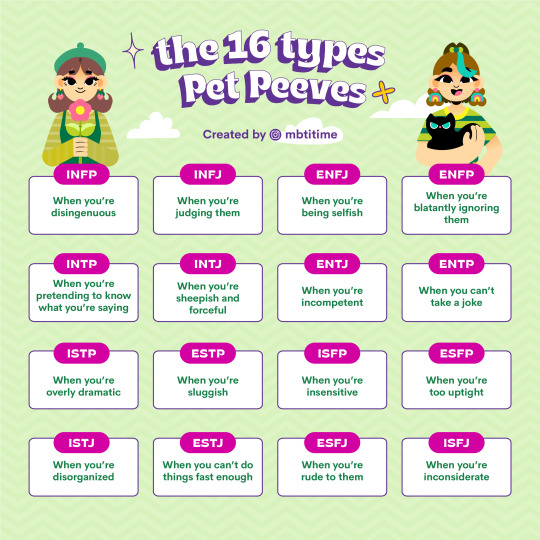
Follow me on:
Instagram, Youtube, Reddit, Twitter, Medium 👉🏻 @ mbtitime
#mbti#16 peresonalities#16 personalidades#16 personality types#infp#infj#entp#entj#enfp#esfp#esfj#isfp#isfj#istp#intp#intj#estj#cognitive functions#myersbriggs#myers briggs
199 notes
·
View notes
Text
INTP x ENTJ 💗✨☁️


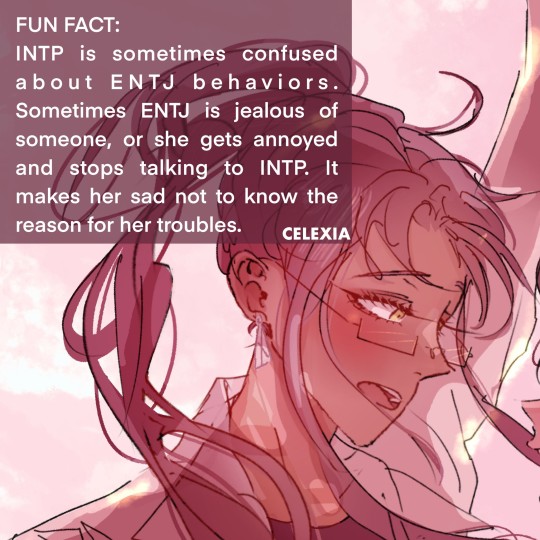
#anime#drawing#mbti#mbtiart#mbtimemes#16personalities#myersbriggs#comic#mbtifun#intp x entj#entj x intp#entj#entj things#entj aesthetic#entj memes#entj personality#intp humor#intp mbti#intp#intp problems#intp girl#intp stuff#intp personality#intp female#manhwashoujo#manhwaedit#manhwa style#manhwa#manhua#mangafille
262 notes
·
View notes
Text
The Sexual Behavior of the 16 Myers-Briggs Personality Types: Introverts
according to socionics, divided by subtype
[extroverts here]
ISTJ-Si: Erotically sexually inventive; value beauty and aesthetics; will not bare monotony. Know how to introduce the elements of games into relations. Are sensitive yet inclined to apathy; need a moderately reasonable and lenient partner capable of rich fantasy and variable behaviors.
ISTJ-Te: Doubt their feelings and yet are erotically daring and initiative taking. Think more of their partner’s sensations than of their own; strives for new sexual techniques. Need an optimistically disposed person capable of encouraging them and being absorbed by interesting prospects.
ISFJ-Si: They are very sexual, inventive and diverse in their intimate plans. Although appearing soft, they persistently display initiative in the approach. They need someone capable of winning their respect and admiration through uncommon abilities – these will aid for a long time in preserving their interest.
ISFJ-Fe: Values frequent sexual contacts. Frequently inconstant in their feelings, but very attentive to those whom they love. At first, they can be tormented by uncertainty, then, intrigued, they are able to take the initiative. When interest in their partner lessens, he can be energized with mild jealousies.
ISTP-Ti: Often show concern about their partner and provide them with pleasant gifts and trifles. Require a sensitive, delicate partner, since they are straight-line/simple in sexual contacts and sufficiently restrained in the positive and negative expression of emotions. Their partner should yield to their persuasions and strive to satisfy all of their requirements.
ISTP-Se: Thoughtful and initiative-taking in care, but uniform in the erotic. Know how to make compliments and establish close contact. Need a sexual, emotional, and romantic partner, whom does not find them boring; a flexible diplomat who knows how to discharge their emotions and is an easily appeased and forgiving person.
ISFP-Fi: Capable of taking initiative if their partner finds it difficult, but only if partner will confidently reciprocate. Have many concealed complexes, which they find difficult to free themselves from; because of these they may seem cold in regards to their erotic feelings. Require both romantic and practical proofs of love, and an emotionally confident partner.
ISFP-Se: In relations they are tactful and attempt to fulfill the desires of their partner. Need a partner that’s not overly demanding; they should be economic and aid in the creation of comfort, order and welfare. Partner should be responsive to their pleasures but more so to their attachments; otherwise they may possibly break relations, ignoring any compromises.
INFJ-Ni: Romantic, elevate themselves in feelings and dream about a great and prolonged love. Appear sexually timid, but their aim is for sexual harmony and the reaching of spiritual and physical perfection. Require a volitional, decisive, active and energetic partner, who possesses feelings of humor and inspiring confidence.
INFJ-Fe: Strongly emotional and they express their emotions easily. Are coquettish, enticing, and dress with taste. Know how to provoke their partner’s initiative. Love sexual games and prolonged preparations. Need a strong, loyal, practical, sensitive and initiative-taking partner; and sufficient support in their lives.
INFP-Fi: Erotically are yielding and shy, await the initiative of another; unpredictable and predisposed to fantasies, inclined to improve sexual relations. Needs a partner who is economic, practical, precise, concrete in words and able to interpret the intentions of others. Honest, they desire a partner with a strong nature that commands a feeling of debt.
INFP-Ne: Aim for aesthetics, harmony and perfection in sex. Wounded, they greatly depend on the emotional state of whom they love. Require proofs of love; need someone initiative taking, optimistic and confident in their self and feelings. In sexual life are slaves of their partner’s demands.
INTJ-Ni: Erotically act somewhat unsure, over-anxious and careful. Need prolonged care or sexual preparation; may somewhat “torment” their object of affection in order to achieve greater emotional incandescence. Need an optimistic and diplomatic partner, who knows how to persuade and is capable of scattering self-doubts. Tendency to await initiative from others.
INTJ-Te: Give freedoms to partner but does not appreciate extremes and will try to stabilize relations. Enjoy emotional preparation and different sexual techniques. Need a partner who encourages their private ventures; a volitional practical person who strengthens the family/household’s welfare.
INTP-Ti: Desire constant stable relations. Find it difficult to display initiative with contacts, however, this difficulty fades when they are confident with their feelings. Attracted to those that reach for them through pleasant food, comfort, sexual initiative, concern for their health and fulfillment of their requirements.
INTP-Ne: Attentive and internally emotional partners. Willing to take the sexual initiative, but also careful and farsighted. Erotically are affectionate and tender; aiming for new impression. Intimate relations require more than trust and sincere concern, need variety in sex in order to raise their moods.
#mbti#myers briggs#16 personality types#socionics#16 personalities#myers briggs type indicator#mbti types#myersbriggs#mbti love#mbti research#introverts#introvert#introversion#subtypes
6 notes
·
View notes
Text
The nine love languages of NFs, empaths and HSPs

I’ve been thinking more about the five love languages model recently, and decided I wanted to do my own blog post elaborating and adding four extra love languages that many NFs, empaths and HSPs would relate to – creative expression, personal growth, humour and spiritual practices. As well as that, I wanted to add more nuance to the original five love languages popularised by Gary Chapman.
There is a great deal of overlap between the different love languages, and many activities could fit into more than one category. For instance, creating an artwork for someone could be a gift but also a form of creative expression. Cuddling with a partner could be a form of sensual touch as well as quality time. A handwritten letter involves words but also is a gift.
Creative expression:
Personal artistic expression (writing poetry, composing a song/music piece, or creating a visual artwork for someone)
Sharing other’s people’s music or creative works (making a playlist or mix tape for someone, sending them a song that’s very meaningful to you)
Collaborating on a creative project together (being part of a band or choir together, creating a collaborative visual artwork, writing a play with someone)
Religious and spiritual practices:
Praying with or for someone, meditating together, singing or chanting with another person
Participating in private ceremonies or rituals together (celebrating Sabbath with a partner and/or family, pagan seasonal celebrations)
Attending group or public spiritual/religious services or events with another person (going to a meditation group together, attending a church/temple/synagogue service)
Personal growth and healing:
Going to therapy, individually and together (this could include coaching, mentoring and couples therapy)
Attending a personal growth or relationship workshop together
Reading a book, watching a talk or listening to a podcast together and discussing what you are learning
Supporting one another to do inner healing work
Humour and laughter:
Telling jokes to make someone laugh, teasing, flirty banter
Sending funny memes, photos, songs or videos
Creating shared in-jokes or giving each other silly nicknames
Watching something comedic together
Original Five Love Languages by Gary Chapman:
Words and communication:
Words of affirmation (compliments, encouraging words)
Frequent texting/check ins (asking “how are you?” regularly, good morning and goodnight texts)
Handwritten letters and cards
Sharing quotes/articles with someone (usually online but could also include printing an article and sharing with with a friend, lending them a book of interest)
Gifts and financial provision:
Practical gifts (buying someone kitchenware when they move out of home for the first time)
Handmade or sentimental gifts (handmade cards, personalised scrapbooks)
Buying an experience with someone (a holiday/vacation, a hot air balloon ride, etc)
Giving money and financial support
Acts of service:
Helping people with things they need, e.g. assisting someone with illness or disability
Doing acts of service to make someone’s life easier, that are not necessary but a nice bonus (cooking for someone who is healthy and able)
One off favours or help (bringing a meal after someone has an accident)
Ongoing and regular support (driving someone to appointments on a weekly basis)
Quality time:
Spending time together in silence (being the same room doing different things, cuddling in silence)
Quality conversation (listening, asking questions, being emotionally vulnerable)
Doing enjoyable activities together (attending to a concert together, going out for a meal, playing sport with someone)
Physical touch:
Platonic affection (hugs, pats on the shoulder/arm, kisses on the cheek)
Sensual touch (non-sexual cuddles, massage, gentle caressing)
Sexual intimacy (making out, or activities involving genitals/breasts/bottom and sexual arousal)
What love languages are most important to you? Do you prefer giving and receiving in different ways? Do you prefer different love languages with friends or family versus romantic partners? Please share in the comments!
#lovelanguages#relationships#communication#nfs#myersbriggs#intuitivefeelers#infp#enfp#enfj#infj#typology#mbti#hsp#highlysensitivepeople
1 note
·
View note